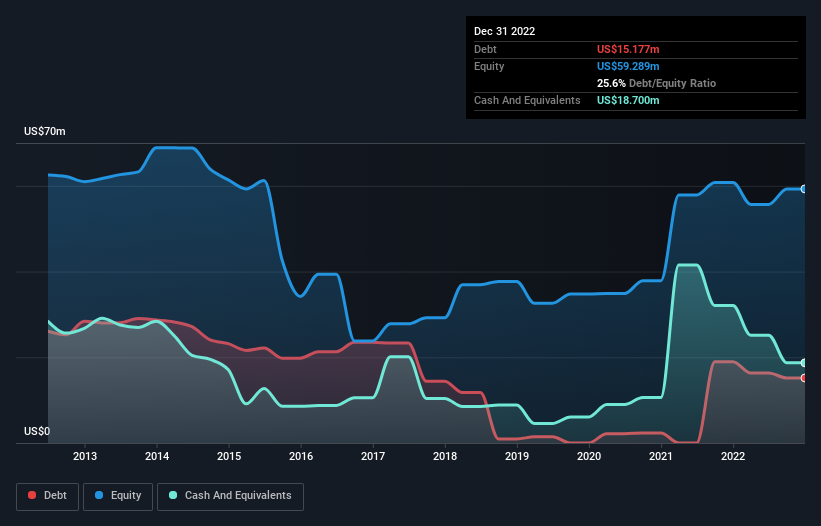The external fund manager backed by Berkshire Hathaway's Charlie Munger, Li Lu, makes no bones about it when he says 'The biggest investment risk is not the volatility of prices, but whether you will suffer a permanent loss of capital.' So it seems the smart money knows that debt - which is usually involved in bankruptcies - is a very important factor, when you assess how risky a company is. Importantly, SHL Telemedicine Ltd. (VTX:SHLTN) does carry debt. But should shareholders be worried about its use of debt?
Why Does Debt Bring Risk?
Debt and other liabilities become risky for a business when it cannot easily fulfill those obligations, either with free cash flow or by raising capital at an attractive price. In the worst case scenario, a company can go bankrupt if it cannot pay its creditors. However, a more usual (but still expensive) situation is where a company must dilute shareholders at a cheap share price simply to get debt under control. Of course, the upside of debt is that it often represents cheap capital, especially when it replaces dilution in a company with the ability to reinvest at high rates of return. The first thing to do when considering how much debt a business uses is to look at its cash and debt together.
Check out our latest analysis for SHL Telemedicine
What Is SHL Telemedicine's Debt?
The image below, which you can click on for greater detail, shows that SHL Telemedicine had debt of US$15.2m at the end of December 2022, a reduction from US$19.0m over a year. However, its balance sheet shows it holds US$18.7m in cash, so it actually has US$3.52m net cash.

How Healthy Is SHL Telemedicine's Balance Sheet?
Zooming in on the latest balance sheet data, we can see that SHL Telemedicine had liabilities of US$17.8m due within 12 months and liabilities of US$33.7m due beyond that. Offsetting these obligations, it had cash of US$18.7m as well as receivables valued at US$9.19m due within 12 months. So it has liabilities totalling US$23.6m more than its cash and near-term receivables, combined.
Since publicly traded SHL Telemedicine shares are worth a total of US$197.4m, it seems unlikely that this level of liabilities would be a major threat. However, we do think it is worth keeping an eye on its balance sheet strength, as it may change over time. While it does have liabilities worth noting, SHL Telemedicine also has more cash than debt, so we're pretty confident it can manage its debt safely. There's no doubt that we learn most about debt from the balance sheet. But it is SHL Telemedicine's earnings that will influence how the balance sheet holds up in the future. So if you're keen to discover more about its earnings, it might be worth checking out this graph of its long term earnings trend.
Over 12 months, SHL Telemedicine reported revenue of US$59m, which is a gain of 19%, although it did not report any earnings before interest and tax. We usually like to see faster growth from unprofitable companies, but each to their own.
So How Risky Is SHL Telemedicine?
We have no doubt that loss making companies are, in general, riskier than profitable ones. And the fact is that over the last twelve months SHL Telemedicine lost money at the earnings before interest and tax (EBIT) line. And over the same period it saw negative free cash outflow of US$7.0m and booked a US$76k accounting loss. Given it only has net cash of US$3.52m, the company may need to raise more capital if it doesn't reach break-even soon. Summing up, we're a little skeptical of this one, as it seems fairly risky in the absence of free cashflow. There's no doubt that we learn most about debt from the balance sheet. But ultimately, every company can contain risks that exist outside of the balance sheet. These risks can be hard to spot. Every company has them, and we've spotted 3 warning signs for SHL Telemedicine (of which 2 are a bit concerning!) you should know about.
If you're interested in investing in businesses that can grow profits without the burden of debt, then check out this free list of growing businesses that have net cash on the balance sheet.
New: Manage All Your Stock Portfolios in One Place
We've created the ultimate portfolio companion for stock investors, and it's free.
• Connect an unlimited number of Portfolios and see your total in one currency
• Be alerted to new Warning Signs or Risks via email or mobile
• Track the Fair Value of your stocks
Have feedback on this article? Concerned about the content? Get in touch with us directly. Alternatively, email editorial-team (at) simplywallst.com.
This article by Simply Wall St is general in nature. We provide commentary based on historical data and analyst forecasts only using an unbiased methodology and our articles are not intended to be financial advice. It does not constitute a recommendation to buy or sell any stock, and does not take account of your objectives, or your financial situation. We aim to bring you long-term focused analysis driven by fundamental data. Note that our analysis may not factor in the latest price-sensitive company announcements or qualitative material. Simply Wall St has no position in any stocks mentioned.
About SWX:SHLTN
SHL Telemedicine
Provides telemedicine services in Israel, Europe, and internationally.
Adequate balance sheet with low risk.
Similar Companies
Market Insights
Community Narratives




